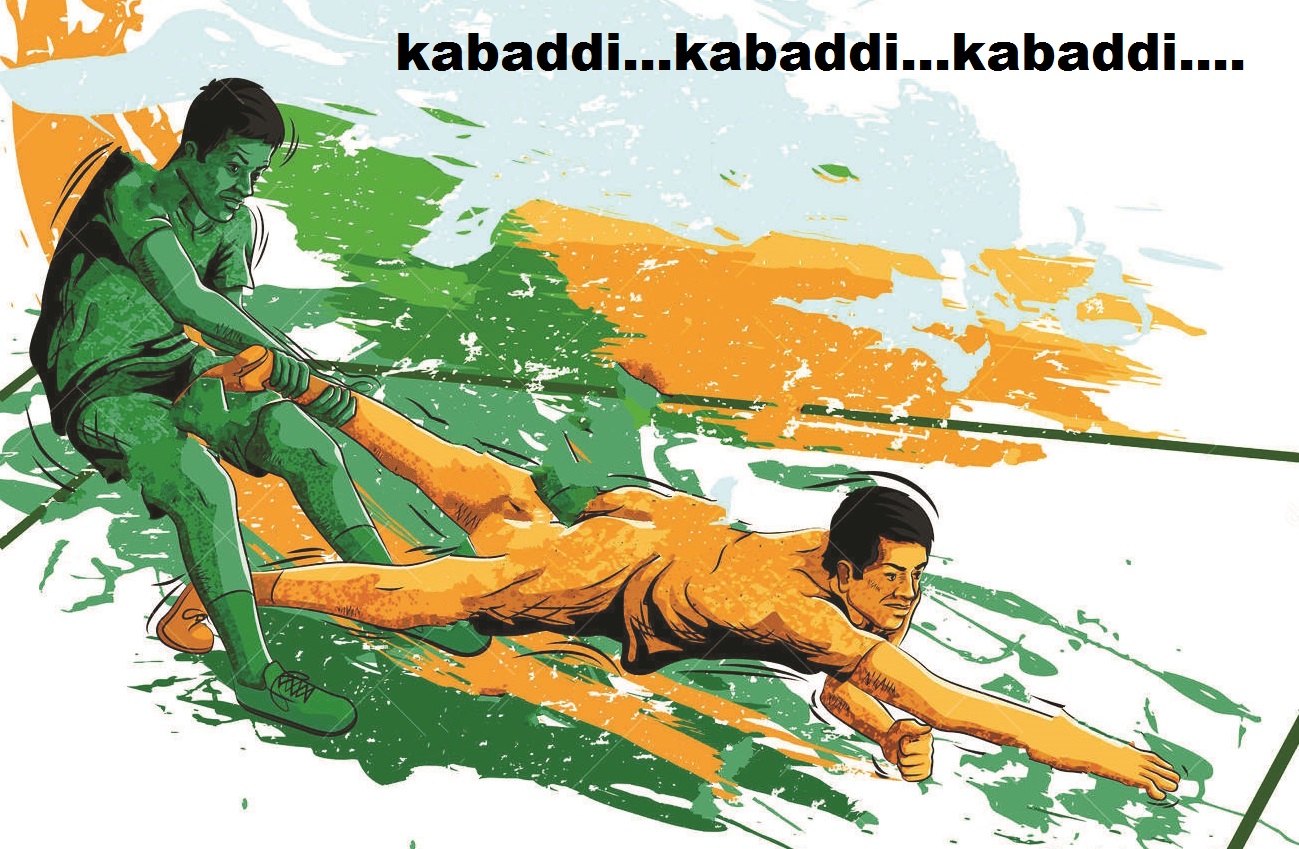Since independence, Kabaddi is the only game that has kept Pakistan in the top ranks of the international ecosystem of sports. And yet we continue to exclusively be a cricket crazy nation. There remain less than a dozen test cricket playing countries while 35 countries across the globe have national kabaddi teams and this number is still growing. And by some sheer dumb luck, our kabaddi team is still among the top three in the world.
No one seems to be thinking to save this one sporting title that we have left, or at least no one did, until now! Following the trail of Pakistan Super League (PSL), Founder & CEO of Strawberry Sports Management Haider Ali Daud Khan is all set to hit the sports block with Super Kabaddi League (SKL) in 2017. Strawberry Sports Management has decided that it’s time for Pakistanis to touch base with the sport.

The ancient game of Kabaddi (literal meaning-holding hands) is considered to have originated in Tamil Nadu. Its first international exposure is believed to have been in 1938 in Calcutta where it debuted in the Indian National Games.
However, Haider believes that the game has a much older and more powerful history. He attributes the origins of the game to 4000 BC in geography of modern day Iran. To him it was never a sport, rather a skill mastered by warriors and the royalty themselves. Overtime only two versions of the game have survived which form the basis of the modern day game.
One of the versions is titled circle style (mud kabaddi), mostly prevalent in Pakistan and Indian Punjab. There is a flexibility of having 10 to 12 players on the team. In addition to players on the ground, there are four substitutes in the squad and two more officials. Of the 16 official members, only ten are allowed to play at a time.
The other format is called the Asian style (or mat kabaddi) which is normally played on a mat within the confines of a gym.
Haider is determined to bring the game back to its long lost glory – at least among the higher factions of the society. Taking an independent stance, he has decided to stay away from state sponsored games. Haider has arranged the Super Kabbadi League (SKL) as a private initiative – the first ever of its kind in Pakistan.
Even though leagues are supposed to be privately owned and managed enterprises, the renowned PSL is not entirely privately owned. However, SKL is completely privately organized and managed and will be played in the ‘circle style’ format.

“You will see various city based franchises, but there won’t be any departments playing in this league.” He added, “To understand this project, it’s very important for us to understand the multiple stakeholders of the game. All these games operate in their own particular peripherals in every country so to promote any game as a league one has to understand its different stakeholders.”
Listing down the stakeholders in this particular case, he said, “If we talk about kabaddi, there is the Pakistan Kabaddi Federation, then comes the state, which in this case is Punjab Sports Board, which has consented to giving us their space to conduct this tournament – and then there are the players.”

Some of the players in the tournament belong to different departments – WAPDA, Pak Army, Police etc. – and there are also some independent players who are not related to any department. Either way, they will lose their departmental identity and will be exclusively playing for SKL for the duration of the league.
There will be six teams for the first season which can be scaled up to ten teams for the upcoming years. The league itself is a ten-year format. Haider is hopeful that the sport will grow multi-fold in the years to come.
The model of the league is based on corporate sponsorship and there is an annual franchise fee that will come from the team owners. These team owners will own the teams for the duration of the league and players from various cities and departments all across Pakistan will take part in the league.
Haider explained that the model of this league is very similar to the Pro-Kabaddi League (PKL) model in India where two entities are responsible – the Mashal Sports Company and the Star Sports media group who jointly own the PKL.
The main difference between between SKL and PKL he noted was that in India the Kabaddi federation is the exclusive technical contributor which helps in managing players and maintaining discipline and order in the games and the tournament when it happens while its Pakistani counterpart will not have any direct involvement in SKL.
The drafting process for the teams in this league is quite similar to PSL. The team owners will be allowed to choose players from the nationwide pool of players.Players need prior consent of their respective departments in order to be part of the selection pool.

Unlike PSL however, SKL does not have any international players for its first season. “This is a conscious decision that we have taken not because of budget constraints but because of the security challenges. Let’s say we have ten international players and seventy local players; all our players would be ignored and the system would be focused on those ten only”, explained Haider.
“SKL will be a men only league at the beginning but there is no denying that an ecosystem has been established that allows women to take part in the game.” said Haider. This ecosystem didn’t develop too long ago but has proven to be successful in a very short time.
“Last year our women’s team went to Iran and won 4 out of 6 games, landing a silver medal. After that, we had the first women’s national championship about a month ago and the standard of the game was very good.” he opined.
Even though Haider is optimistic about the league, he made no bones about the state of sports in the country altogether. He said, “In Pakistan the advent of events like leagues took so long because there is a genuine void of sports here despite the presence of good players”. However, he doesn’t hold any single institution responsible for the downward drive. “If you know all the stakeholders of the game and the plight of sports in general in Pakistan, it doesn’t mean that none of these stakeholders are working.
According to Haider the factor most lacking is coherence between the different stakeholders. He also accentuated the lack of imagination as being a major hurdle in proper development of sports in the country.
Haider is also aware of the risks of this tournament from a business and profitability point of view. The biggest stakeholder – Corporate sponsors – are not being attracted to these platforms because Pakistan has not been able to produce a champion player or team in the past few years.
He said, “This is the void that we thought needed to be addressed by a sports management company.” There have been instances when despite winning the Asia cup or producing tennis and squash champions, the nation itself does not seem to be interested in any sport other than just cricket. This could be a potential threat to the success of the entire league.
Haider however also looks at this as a big opportunity. “Frankly when I look at sports, I don’t consider it a very technical matter and you need to understand how it is played. Around the world, there has been a story first and then the sports come in. So we believe that first of all we are building a story around the sports, which is far more important and a bigger message than the technicalities of the sport.” he explained.
When asked why he chose kabaddi with an audience that is predominantly cricket crazy he said, “We did proper research and found that while cricket is what it is, in terms of any sport which has a potential for scalability and which is currently understood and played by a large number of people, Kabaddi was the clear winner”.
His endeavors are not a spur of the moment decision. Before starting to brand SKL, he researched the feasibility of Kabaddi as it has mostly been a rural game. “Sitting here in a Metropolis and talking about Kabaddi we may not be able to comprehend it but around 60pc of population in the rural areas still plays it. Moreover in the last 20 years there has been a net migration from rural areas to urban areas, so a considerable proportion of the metropolitan cities are a fan of the game. Besides cricket and kabaddi don’t have to be mutually exclusive and people can enjoy both.”
He further said, “I am a firm believer that growth of any sport is not a zero sum game but since the unfortunate attack on the Sri Lankan cricket team in 2009, there has been no international cricket in Pakistan. Our team is travelling across the globe but there is a dearth of this sport actually happening here”.
Talking about sports and its positive effects on the economy he said “the truth is that whenever a sports event happens in a particular geography, a whole economy develops around it. So even if there are not big sponsors like Coke and Pepsi, there are a plethora of sponsors who wish to do trade marketing and have booths and not necessarily massive amounts. So even if we don’t have bigger sponsors, we will have several smaller sponsors.”
So far Strawberry Sports Management does not have any public relations management company or marketing agency on board but they are planning to take someone on board. However, he doesn’t consider a PR agency as a major factor in promotion of a game event. He also dismisses any criticism about people not showing up on an event like Super Kabbadi league.
Haider tried to debunk this perception by sharing his personal experience. “For a game that is considered to be a Punjabi game, I was at a match happening in Bannu between Bannu district and Peshawar district which was not featuring a single national player and the crowd was more than 50,000 people and the only advert for that match was local cable TV of Bannu which was activated two weeks prior to the match and the announcement was made only on speakers, therefore there is a lot of potential on ground.”
He is convinced that cricket has become a bit of a fraught despite the heavy popularity of PSL. “Even though I am a big fan of PSL myself, because it has opened room for imagination for leagues happening in Pakistan, the structure underneath the game has all gone dilapidated.” With Kabaddi, the conditions are the opposite as there is a strong structure but the game needs to be pushed into the limelight.
Talking about the costs and expenses of the event Haider said, “We are ourselves doing all the cost contributions, the owners of teams are paying for the costs of the team and sponsors are only for the tournament, not for covering other costs but the actual costs will come out when the deal is closed”.
“Until then I can give you an approximate idea that the average price of one of our teams is about one tenth of the average price of a PSL team.” he revealed.
Players are at the center stage of this game so they are being given several financial incentives. He said, “Considering my own expenses, I cannot give you an accurate estimate because the cost isn’t only in monetary terms but also in time and effort.”
The source of revenues for him and his team in terms of event management comes from event sponsors, franchise fee coming from the team owners, gate revenue, media rights monetization and merchandizing of the overall event.
The merchandizing of individual teams would be their own responsibility, but the tournament’s merchandising will be ours. The expenses on the other hand include venue arrangements, opening and closing ceremonies, marketing (media cost, PR, digital, conventional etc.), prize money, (player’s fees would be picked up by the team owners), annual payments to the federation and payment for media rights. The guests and judges that we are inviting also incur cost. Delegates, technical experts, observers, members of contemporary federations etc.
An interesting aspect of the expenses of SKL as compared to PSL is that for popular games like cricket, the channels pay for these rights but for this Kabaddi tournament the organizers have to pay the channels to televise it. Haider hopes that for the first couple of years this is an expense that would turn around to the revenue side.”
He is going to organize two more national super leagues for wrestling and Volleyball. “We are doing three leagues for now, Kabaddi, Volleyball and Wrestling. In the first season of all three games, that will happen in 2017, we will only have national players.”
This is not the first experience for Haider to arrange such a tournament, although not on such a huge scale. A while ago, he had arranged a Rugby match and that match helped in encouraging the company to delve into sports that don’t have wide appeal.
“We have a women’s team and a men’s team for Rugby. There are some private clubs and also some state institutions supporting.” he said. Delving deeper into the details of the game he said that since Rugby and Kabaddi are both contact sports, a few players are part of the national teams of both sports. “Three national rugby players are also three national kabaddi players. These both are full contact sports so players can build skills of both without compensating on the other one.”
Haider’s plans are beyond this SKL series. He is going to organize two more national super leagues for wrestling and volleyball. “We are doing three leagues for now, Kabaddi, Volleyball and Wrestling. In the first season of all three games, that will happen in 2017, we will only have national players.”
He also plans to extend his company’s training and development operations to international players as well. “We will be able to train and develop international players as well, but our primary motive remains to train our own players first. There are proper management and training opportunities in many foreign countries already so we want to focus on our own players first.”
The title of ‘Strawberry’ sounds unrelated to a sports company but Haider has an elaborate explanation for this too. “We didn’t want to have a very corporate name and we decided not to get hung up on the short term consciousness of awkward sounding name and chose Strawberry. It is a fruit associated with instant energy.” He added, “Secondly this fruit has its seeds on the outside and because our vision and mission is all about bringing Pakistan to the outer floors.”
Describing his vision with respect to the whole league he said, “We have no false hopes that by having these leagues, these games would jump to the top overnight. The players who will join now have come through a system and have their respective age groups. Someone who can only play for two more years won’t be able to play for this ten year format.
As for future players Haider said “we need to scout newcomers and young players and if they are looking at the game sitting on the fence thinking this could be their profession and turn that passion into a career, that would be the ultimate result. The current players can also continue to be part of the game and give back to the game by coaching and training new players.”








Great thought by Haider Ali. We wish him the very best. Pakistan must raise its sports and rise through its sports.
Comments are closed.